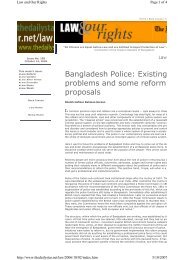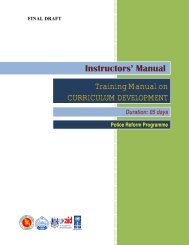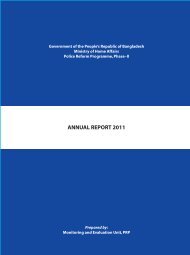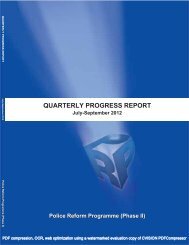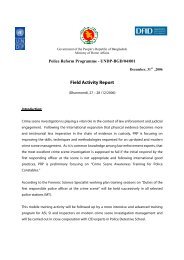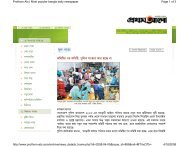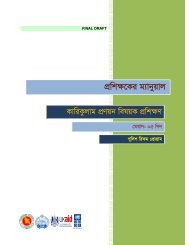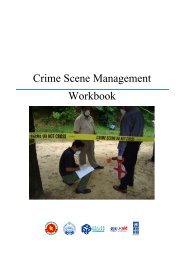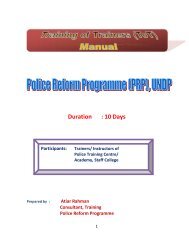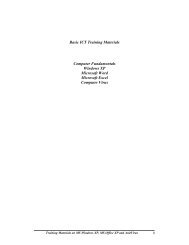Annual Report - Police Reform Programme
Annual Report - Police Reform Programme
Annual Report - Police Reform Programme
Create successful ePaper yourself
Turn your PDF publications into a flip-book with our unique Google optimized e-Paper software.
<strong>Police</strong> <strong>Reform</strong> <strong>Programme</strong><br />
(Phase-II)<br />
INVESTIGATIONS, OPERATIONS, AND PROSECUTIONS<br />
Key Outcome: Improved police operations, investigations, and prosecutions to enhance fair and<br />
equitable justice<br />
Key Activities and Progress:<br />
Output 3.1: Investigation and prosecution processes upgraded from confessional to evidence<br />
based procedures<br />
During 2012, the PRP contributed to the ongoing review of the Evidence Act. In collaboration with the<br />
UNDP Access to Justice (A2J) Project, the PRP provided a detailed submission in response to the draft<br />
Proposals for <strong>Reform</strong> of Bangladesh Laws Relating to the Admissibility of "Scientific Evidence." The<br />
PRP also provided impetuous support to the A2J Project and Governance cluster, resulting in the<br />
involvement of prosecutors during the consultation process.<br />
The PRP conducted a rapid assessment of the Dhaka Chemical Laboratory in preparation for the<br />
development of the 2013 <strong>Annual</strong> Work Plan (2013 AWP). The Head of the Chemical Laboratory<br />
identified a number of training activities required by his staff and these requests were considered during<br />
development of the 2013 AWP.<br />
The PRP provided assistance to the CID in order to populate the Automated Fingerprint Information<br />
System (AFIS). This initiative involves collecting approximately 67,000 fingerprints from convicted and<br />
remand prisoners in prisons throughout Bangladesh. The PRP supported the training of one hundred<br />
officers in fingerprint collection techniques and released a tender to procure equipment required to<br />
collect 67,000 fingerprints from detainees. The AFIS database population will increase the likelihood of<br />
investigators being able to match fingerprints found at crime scenes with fingerprints of previously<br />
incarcerated individuals.<br />
The PRP sponsored a Bangladesh <strong>Police</strong> study tour to the Royal Thai <strong>Police</strong> Forensic Training School<br />
which contributed to the establishment of the Forensic Training Institute (FTI) in CID. The FTI is the<br />
focal point for delivery of all forensic science training and is expected to enhance the Bangladesh<br />
<strong>Police</strong>'s capacity to collect more physical evidence from crime scenes in a professional manner.<br />
Forensic Working Group workshops were conducted to determine the extent of investigators seizing<br />
evidence and conducting forensic analysis when appropriate. The assessment determined that monthly<br />
returns are only inclusive of data related to seizure of drug-related exhibits. In consideration of the<br />
findings, further Forensic Working Group meetings have been planned to address this shortcoming.<br />
During this period, the PRP provided support to the Forensic Focus Group to develop an annual budget<br />
for Dhaka and Chittagong Forensic Laboratories which are linked to the forensic strategic plan;<br />
however, challenges persist. The CID does not have a separate budget for each crime division<br />
including forensics, and the issue of recurrent funding for the Forensic Laboratories continues to be<br />
problematic. This matter has been raised with the NPD who plans to schedule discussions on the<br />
subject with the IGP and seek future funding.<br />
There have been multiple obstacles associated with the procurement process for supplying chemicals<br />
to the CID Forensic Laboratories at Mohakhali and Chittagong. The initial Service Request Form (SRF)<br />
was raised in November 2011; however, the vendor failed to deliver any of the items and the contract<br />
was cancelled. Though a new SRF was created in June 2012, the tender process failed to identify any<br />
technically qualified suppliers. The UNDP Procurement Section advised the PRP Operations Manager<br />
to procure these chemicals under NEX and the tender will be released in the first week of January<br />
2013. Additionally, ten fully furnished workstations were installed to support the Mohakhali Chemical<br />
Laboratories and improve the working environment.<br />
20<br />
<strong>Annual</strong> <strong>Report</strong> 2012



